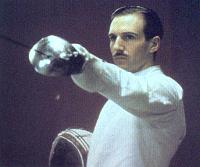Sunshine

World champion: Adam (Fiennes) becomes a national hero ... after he converts to Catholocism.
dir Istvan Szabo
scr Istvan Szabo, Israel Horovitz
with Ralph Fiennes, Jennifer Ehle, Rosemary Harris, William Hurt,
James Frain, Miriam Margolyes, Molly Parker, Rachel Weisz,
Deborah Kara Unger, John Neville, David de Keyser, Katja Studt
Alliance 99/Hungary-Canada

Review by Rich Cline
Oscar-winning filmmaker Szabo (Mephisto, Colonel Redl) tackles his country's history with the sweeping three-hour epic Sunshine, tracing some 150 years in the life of a Hungarian family through four generations. As a historical document the film is fascinating, examining the shifting political tides in Eastern Europe. But as a movie, it's oddly uninvolving ... and a bit forced.
We begin with Emmanuel Sonnenschein (de Keyser), who starts the successful family business based on his father's herbal drink Taste of Sunshine (a play on their surname). From here we follow his son Ignatz (Fiennes), who changes his surname to Sors to avoid prejudice against Jews as he advances his career as a lawyer and judge. Ignatz marries his cousin Valerie (Ehle and then Harris), and their son Adam (Fiennes again) becomes a fencing champion and national hero by converting to Catholocism, as Jews would never be allowed to join the Olympic team. Adam marries another former Jew (Parker) and has a son, Ivan (Fiennes yet again), who narrates the film. But the Nazis soon ship the whole family off to the concentration camps.
There are several other family members along the way, and it's to Szabo's credit that he keeps everyone clear, even as actors switch over the years, and as Fiennes changes facial hair from character to character. The performances are superb, and yet no one really connects with the audience, despite a heavy concentration on romance and sex. The characters' lives are all far too symbolic and meaningful in the grand scheme of things. And there's just a bit too much tampering with real life--filling every event with implications and messages about seeing beyond politics to the human beings involved. Beautifully made, but not exactly original. Still, there are powerful moments ... and some lovely small scenes that keep us interested as the saga goes on and on.
[15--adult themes and situations, language, nudity] 25.Jan.00
UK release 28.Apr.00; US release 9.Jun.00
~~~~~~~ ~~ ~~~ ~~~~
READER REVIEWS
"This is three-hour long film is a fascinating history lesson of Hungarian history in the last century, but the human stories that go along become tiresome and boring--when they could have been fascinating and riveting. Fiennes plays the lead character of all three generations of the same family--all three characters are cold, wooden, unfeeling and played with the same emotional tone. All the love stories are straight out of pulp novels--all the sex scenes are basically about illicit sex and are violent and about who is in control. The only sex scene that takes place within a marriage is basically a rape. The best bedroom scene, in fact, is near the end as the youngest character Fiennes plays shares the family bed with his aged grandmother (a luminous Rosemary Harris, who's wonderful in the role and brings 'sunshine' to every scene she is in) as they huddle together as survivors after years of devastation to their family through the fall of the Austro-Hungarian empire, World War I, the rise of anti-Semitism and Nazism, World War II, fascism, Communism and finally freedom from oppressors in 1956. Here there is real tenderness and unselfish love which we are longing to see in these characters. The great-grandfather in the early scenes is the only other character that seems not to be driven totally by selfish desire. Most of the scenes are bloated with extra material that saps the film of true drama. The fencing scene at the Berlin Olympics, for instance, goes on and on and on, when the drama could have been captured in half of the time. The producers who make miniseries for TV should have cut the film for cinematic purposes. The torture, beating and death by freezing of a naked Fiennes in a winter concentration camp also goes on and on to the point of exploitation. The use of actual footage of historical events is interesting but awkward, especially when Fiennes is put into the scenes a la Forest Gump. To sum up, I was disappointed in the film because most of the characters were so cold and selfish that I had little empathy for them and their situations. The disintegration of the Jewish family as the sons change their family name and eventually become Christians should have carried much more drama and pain but I really didn't care what was happening to such egotists. The cinematography was outstanding however and the locations were breathtaking; I did enjoy a glimpse into a world I didn't know. If you have three hours of your life in which to see some fascinating history, go see it; if you want to see drama of characters you want to love, skip it." --Bobbie L, St Louis.

© 2000 by Rich Cline, Shadows
on the Wall
HOME | AWARDS
| READER REVIEWS | Q&A | ABOUT | TALKBACK


